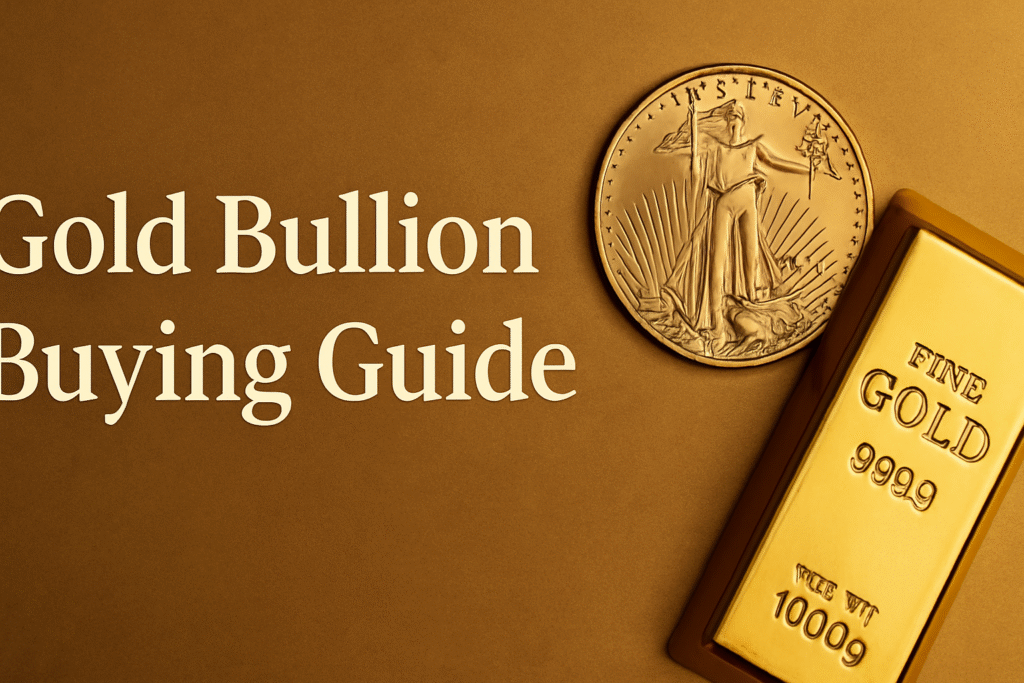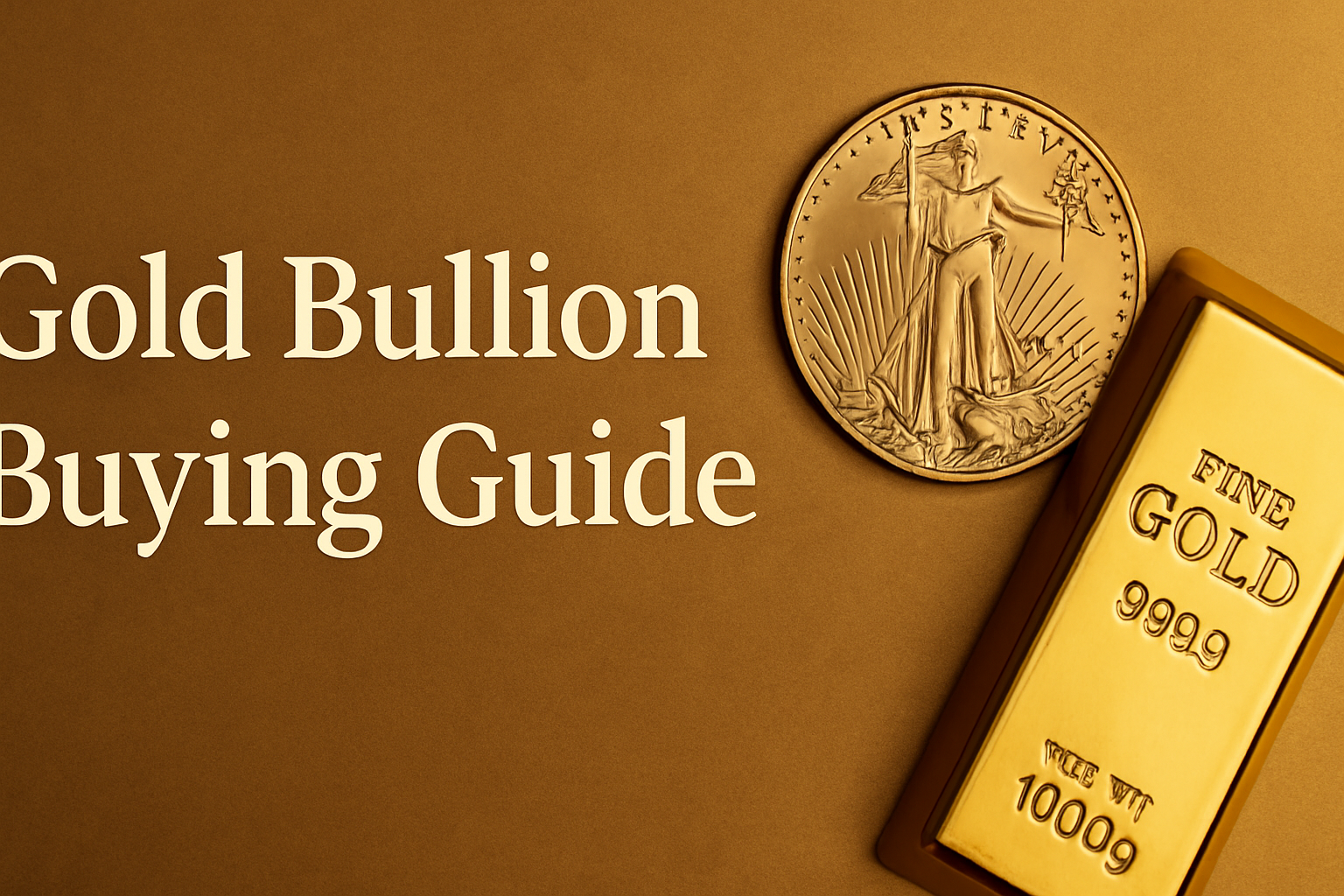Gold has captivated humankind for centuries. From ancient coins and royal regalia to modern-day investments, its glow has always signified wealth, stability, and enduring value. In today’s unpredictable economic climate, more and more people are turning to gold bullion as a safe haven—an anchor in financial storms.
If you’re thinking about investing in gold bullion for the first time, this guide is your go-to resource. Whether you’re a cautious beginner or an inquisitive investor, we’ll help you navigate the shiny world of gold bullion with confidence.
Why Buy Gold Bullion?
Let’s start with the basics: why buy gold bullion in the first place?
Gold bullion isn’t just a luxurious asset; it’s real money—tangible, finite, and immune to the whims of central banks or digital manipulation. Unlike paper currency, gold has intrinsic value that has withstood recessions, wars, and global upheavals.

Here are a few reasons why gold bullion might be right for you:
- Hedge Against Inflation: Gold retains purchasing power even when currencies lose value.
- Wealth Preservation: It holds its value over the long term, often rising during economic downturns.
- Portfolio Diversification: A touch of gold can balance riskier assets like stocks or real estate.
- Privacy and Control: Owning physical gold gives you full control—no intermediaries, no system dependence.
Thinking this might be the right asset to add to your portfolio? Let’s dig deeper.
What Is Gold Bullion?
Gold bullion refers to high-purity physical gold, often in the form of bars or coins. It is distinct from collectibles or jewelry—it’s valued based on its weight and purity, not artistic merit or scarcity.
Types of Gold Bullion
- Gold Bars
- Ranging from small 1-gram bars to hefty 1-kilo blocks.
- Typically more cost-effective per ounce than coins.
- Ideal for serious investors who prioritize value over design.
- Gold Coins
- Government-minted with legal tender status.
- Popular choices: American Gold Eagle, Canadian Maple Leaf, South African Krugerrand.
- Slightly higher premiums but more recognizable and often easier to sell.
💡 Looking to start small? Check out trusted sellers like APMEX or JM Bullion for fractional gold coins or 1-gram bars.
How Much Should You Invest?
There’s no one-size-fits-all answer. A good rule of thumb? 5% to 15% of your portfolio in precious metals, depending on your risk tolerance.
Start small. You don’t need to buy a kilo bar out the gate. A few ounces of gold coins or smaller bars can help you get a feel for the market without overwhelming your budget.
Pro Tip:
Before you dive in, define your goals.
- Are you protecting against inflation?
- Preparing for a rainy day?
- Hoping for long-term growth?
Each goal influences what, how much, and how you buy.
Where to Buy Gold Bullion Safely
With gold’s rising popularity, scammers and shady dealers are unfortunately part of the game. The key is to buy from reputable sources. Here are your best bets:
1. Online Precious Metal Dealers
- Convenient and often competitive on price.
- Reputable options include:
- APMEX
- JM Bullion
- SD Bullion
- BullionVault (offers both storage and ownership)
- Look for transparent pricing, customer reviews, and authentication guarantees.
2. Local Coin Shops
- Personalized service and the ability to inspect your purchase in person.
- Great for beginners who want to ask questions face-to-face.
3. Mints and Government Programs
- Examples: U.S. Mint, Royal Canadian Mint.
- Excellent for buying official gold coins with assurance of authenticity.
🛒 TIP: Always compare prices before buying. Gold spot price fluctuates daily—smart buyers check the spot price and calculate the premium.
Understanding Premiums and Pricing
The price of gold bullion is not just the gold spot price. There’s also a premium—a markup added by the seller to cover manufacturing, distribution, and profit.
Example:
If the spot price of gold is $2,000 per ounce and a 1-ounce coin sells for $2,100, the premium is $100, or 5%.
Coins usually have higher premiums than bars, but they’re also more liquid.
Be cautious of premiums that seem too high—especially from infomercials, “rare” coin dealers, or unsolicited calls. A legitimate dealer will always clearly list the spot price, the product premium, and shipping costs.
Storage Options: Where Should You Keep Your Gold?
So you’ve bought gold—now what? Storage is a major consideration.
1. Home Storage
- Pros: Full control, quick access.
- Cons: Requires a high-quality safe, risk of theft.
- Tip: Avoid advertising your gold stash. Keep your purchase discreet.
2. Bank Safety Deposit Box
- Pros: Secure, reliable.
- Cons: Limited access, not insured for precious metals in some banks.
3. Vaulted Storage Services
- Offered by companies like Brinks, Loomis, or BullionVault.
- Pros: High security, insured, global options.
- Cons: You pay storage fees.
🔐 Want peace of mind? Consider insured storage with segregated vaults. Your gold stays separate, safe, and always traceable.
Selling Gold Bullion: How and When
Gold is a liquid asset—you can sell it relatively easily, but timing matters.
- Sell when prices rise above your purchase cost.
- Avoid selling in a panic. Gold is a long-term asset.
- Compare offers from dealers, coin shops, or online platforms.
Make sure you keep all documentation, including receipts, certificates, and assay cards. These prove authenticity and ensure smoother resale.
💸 Curious about current selling prices? Many dealers list “buyback” prices on their websites—use these for reference.
Spotting Fakes: How to Protect Yourself
Sadly, counterfeit gold is real. But with a little vigilance, you can avoid falling victim.
Warning Signs of Fakes:
- Prices too good to be true.
- No clear weight or purity markings.
- Unfamiliar or sketchy sellers.
How to Verify:
- Check for weight and dimensions. Every coin/bar has standard specs.
- Use a magnet. Gold isn’t magnetic.
- Buy with assay certificates or from mints that offer serial numbers.
🎯 Want to learn how to spot real vs. fake gold? Bookmark Gold.org for expert tips.
Taxes and Reporting: What You Need to Know
Gold isn’t just shiny—it can be taxable. Understanding the legal and tax implications of buying and selling gold helps avoid surprises.
- In the U.S., profits from selling gold are subject to capital gains tax.
- Dealers may require a Form 1099-B for certain transactions.
- Sales tax may apply when buying in certain states.
Consult with a tax advisor, especially if you’re investing heavily. Better safe than audited.
📘 Need help tracking your gold purchases and sales? Tools like GoldTracker App help you stay organized.
Common Mistakes to Avoid
Many first-time investors get caught up in the gold rush and make preventable errors. Here are a few to watch out for:
- Buying without research: Don’t trust just any website or seller.
- Ignoring storage logistics: Know where you’ll keep it before you buy.
- Chasing price trends: Gold is a long game, not a day trade.
- Falling for numismatic hype: Stick with bullion unless you’re a collector.
Take your time. Buying gold is a smart move, but it’s also a serious one. Treat it like any other investment—with care and due diligence.
Final Thoughts: Is Gold Bullion Right for You?
If you’re looking for an investment that’s tangible, time-tested, and trusted, gold bullion checks all the boxes. It might not offer explosive returns like tech stocks, but that’s the point—gold is about stability, not speculation.
With proper planning, reputable dealers, and secure storage, your investment can be both meaningful and profitable.
Ready to Get Started?
👉 Curious where to buy your first gold bar or coin? Explore verified vendors like JM Bullion or APMEX—they offer beginner-friendly guides and great selections.
📩 Want tips, updates, and gold insights in your inbox? Subscribe to newsletters from Kitco or GoldSilver to stay informed.
🔎 Have more questions? Use online forums like r/PreciousMetals or communities on Discord to chat with seasoned gold buyers.
Gold Bullion FAQs
Q: Is gold bullion the same as jewelry?
A: No. Gold bullion is investment-grade gold, usually .999+ purity, meant for saving—not wearing.
Q: Can I include gold in my IRA?
A: Yes! Look into “Gold IRAs,” which allow you to hold physical gold in a tax-advantaged retirement account.
Q: How often should I buy gold?
A: There’s no perfect frequency—many investors “dollar-cost average” by buying small amounts regularly.

